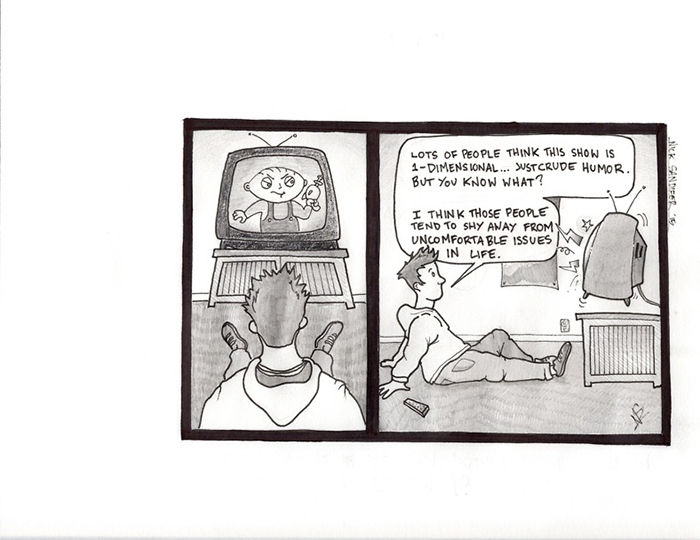A great platform for educating the youth
October 21, 2015
Like most children of the 90s, much of my free time as a young man was spent watching animated cartoons on TV.
I grew up on a steady diet of South Park, Family Guy, the occasional Simpsons episode and whatever bizarre show was airing on Adult Swim at 1 a.m.
At the time, it seemed like nothing more than cheap, mindless entertainment to pass the time, and often that was the case. But looking back, these shows actually served a much more useful purpose.
By delving into serious and often controversial issues and addressing them with humor, shows like South Park and The Simpsons helped me – and many others in my generation – to develop social consciousness, skepticism and appreciation for the value of satire in a free society.
As a medium, animated shows are much more relatable and accessible to young adults than many other media. By addressing controversial issues, animated shows inform and challenge young people in a way that many other forms of media cannot.
In 2010, South Park produced an episode featuring a depiction of the prophet Muhammad. After numerous online threats against the show’s creators and producers, Comedy Central decided to censor the episode, sparking a national debate about free speech and the ability to freely express criticism of Islam in the U.S. A survey later found that 71 percent of respondents disagreed with Comedy Central’s decision.
By exploring this issue, South Park exposed its young fan base to an extremely important conversation about free expression, political correctness and the boundaries of acceptable satire. Had there not been a medium like South Park available, no other medium could have engaged young people with these issues as effectively.
Animated shows have become a staple of contemporary cultural criticism, although more often than not they target surface-level pop culture rather than broader social issues. However, when these issues are addressed, they are addressed incisively and in great detail.
The subject matter of animated shows can often serve as a reflection of how society is changing.
In recent years, the writers of Family Guy have alluded to the fact that Stewie Griffin, one of the most popular characters on the show, is gay, or at the very least sexually ambiguous.
Putting aside the absurdity of a one-year old baby having a sexual identity, the decision to insinuate that fact clearly reflects changing attitudes toward homosexuality in American society. Fifteen years ago, for example, most Americans would have been hostile to the idea of an openly gay character, especially in a show targeted at teens and young adults.
Some might interpret this as the writers trying to push their beliefs or indoctrinate their viewers. In some instances, that may be the case, but these shows are targeted more toward culturally literate teenagers than younger, impressionable children.
It’s important for young people to be conscious of important issues facing society, and it is crucial that young people understand how to address these issues properly. Animated shows like South Park and Family Guy have done more to accomplish this than any other medium thus far, and deserve more recognition than they receive.
Russell Behrmann is a senior communication major from Bellevue. He can be contacted at 335-2290 or by [email protected]. The opinions expressed in this Column are not necessarily those of the staff of The Daily Evergreen or those of The Office of Student Media.





















